
Zoholics USA 2025, Zoho's premier annual user conference, convened from May 13th to 15th at the George R. Brown Convention Center in Houston, Texas. This gathering serves as a vital nexus for Zoho users, partners, and industry thought leaders, providing a platform to explore the latest technological advancements and foster connections within the expansive Zoho ecosystem. The conference's core purpose revolves around showcasing product innovations, offering expert-led sessions, facilitating networking opportunities, and ultimately demonstrating how Zoho solutions can drive business success and growth.
A clear and consistent theme permeated discussions and announcements throughout Zoholics USA 2025: automation empowered by the intelligence of Artificial Intelligence (AI). This overarching theme points to Zoho's deliberate and accelerated strategic direction, focusing on embedding AI deeply within its comprehensive suite of applications. The objective is to render automation smarter, more effective, and broadly applicable across an even wider spectrum of business processes.
Our article today on day 2 of Zoholics offers an in-depth examination of the key highlights from Day 2 of Zoholics USA 2025. Building upon the significant announcements and strategic vision established on Day 1, this analysis explores how Zoho's ongoing advancements, particularly in the realms of AI, automation, Customer Relationship Management (CRM), and other pivotal business areas, are actively shaping the future trajectory of business transformation. The focus remains on identifying and explaining the tangible value these developments offer to organizations navigating the complexities of the modern digital landscape. Understanding the takeaways from an event like Zoholics is crucial for businesses seeking actionable strategies and insights to effectively leverage Zoho's tools, ultimately aiming for enhanced growth, improved efficiency, and a sustained competitive advantage.
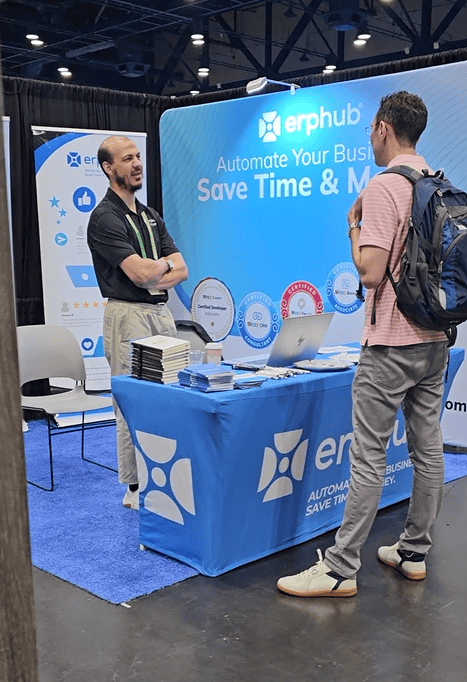
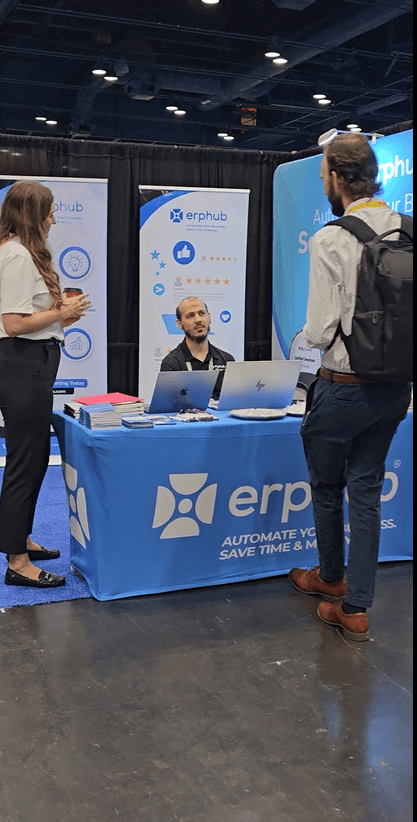
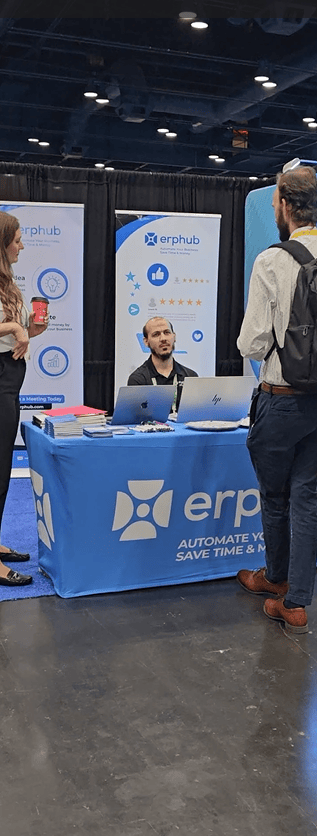
Foundations: Setting the Strategic Direction
The Zoholics USA 2025 experience commenced with a dedicated day of pre-event workshops on May 13th. These full-day sessions provided attendees with an exclusive opportunity for focused, hands-on learning across core areas of the Zoho ecosystem, including Sales (Zoho CRM), Marketing (Zoho Marketing Automation/Campaigns), Finance (Zoho Finance Suite), Project Management (Zoho Projects), BI & Analytics (Zoho Analytics), and Developer Tools (Zoho Creator/Flow). Participation in these workshops required a separate add-on purchase to the general admission ticket, underscoring their premium and in-depth nature. This dedicated day, preceding the main conference agenda, highlights Zoho's emphasis on building user capability and fostering deep skill development across its foundational application areas. By ensuring attendees had a solid understanding of the core tools before the major product announcements and strategic keynotes of the main conference days, Zoho facilitated a deeper appreciation and comprehension of the significance of the new features and AI/automation advancements subsequently discussed. This structure positions the workshops not merely as optional training, but as crucial preparation for maximizing the value derived from the main event content. It underscores a commitment to practical application and user empowerment, indicating that successful digital transformation with Zoho begins with mastering the basics and understanding the core capabilities before scaling to advanced automation and AI.
Day 1, May 14th, marked the official opening of the main conference with keynote sessions. These sessions are traditionally where Zoho's leadership team outlines the company's strategic vision, discusses key trends, and unveils major product developments. A significant focus of the 2025 keynotes was anticipated to be on how Zoho is actively shaping the future of business technology through AI-driven advancements. Discussions were expected to cover innovation, customer success, and the roadmap ahead, with a particular emphasis on how Zoho's AI is transforming business efficiency, decision-making, and automation to help businesses stay ahead in an ever-changing digital landscape. The mention of 'Agentic AI at Zoho' as the title of the Day 2 closing common session further reinforced that advanced AI capabilities were a high-level, strategic focus for the company throughout the event. By initiating the conference with the strategic "why" – articulating the transformative potential of AI and automation for business efficiency and decision-making – the keynotes provided a crucial backdrop that allowed attendees to better understand the significance of the specific product details revealed later in the day.
Several major product launches and enhancements were announced on Day 1, setting the stage for the deeper dives on Day 2.
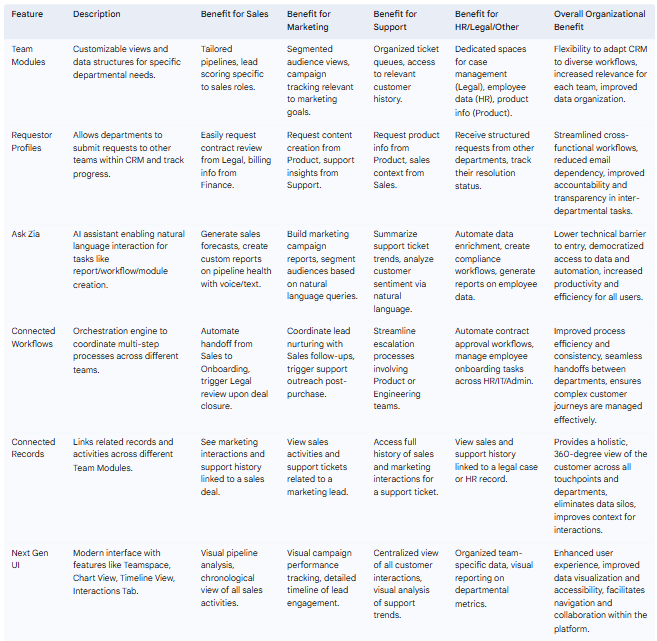
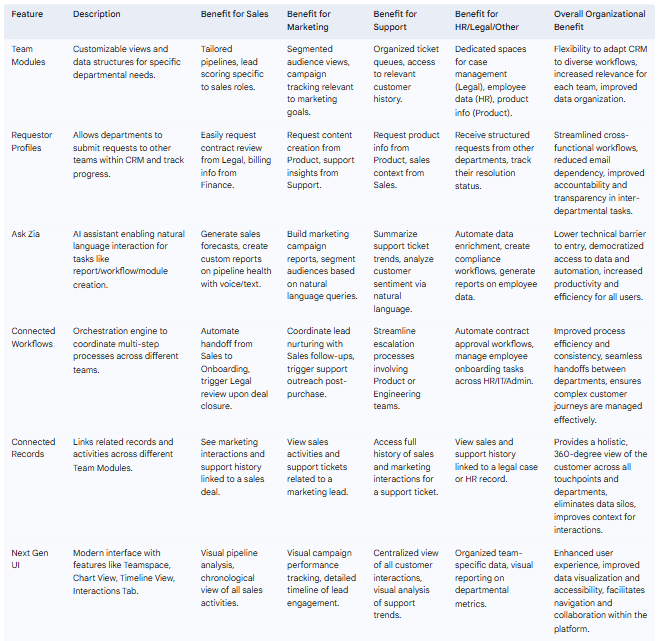
Business Transformation Tracks & Sessions
Beyond the keynote announcements, Day 2, like Day 1, featured a diverse array of breakout tracks and sessions covering various business functions and industries. These sessions provided attendees with practical guidance, best practices, and deep dives into specific Zoho applications and their role in driving business transformation.
- Focus on Core Business Areas: Sessions were organized across numerous tracks, including those focused on core business areas critical to transformation:
CRM & Sales Transformation: Sessions in this track delved into leveraging Zoho CRM for enhanced sales performance and customer relationship management. Topics included best practices for managing sales processes, strategies for enhancing lead management, and techniques for fostering stronger customer relationships. A significant emphasis was placed on AI-powered client acquisition and enhanced automation in sales processes, leveraging Zia's capabilities for smarter lead acquisition, data enrichment, and predictive forecasting. Discussions also covered enhancements to dashboard customization for real-time filtering and analysis , improved communication integrations with platforms like WhatsApp and Line , expansion of Guided Selling support to custom modules , refinements in data management like updates to subforms and formula fields , and streamlined sharing rule management. An Account-Based Marketing (ABM) add-on for Zoho CRM was anticipated, designed to help businesses extract greater value from existing accounts through targeted campaigns. Enhancements to Configure, Price, Quote (CPQ) capabilities were also expected to improve efficiency and accuracy in quoting.
The extensive list of anticipated CRM enhancements, heavily weighted towards automation, AI, and communication channel integration, indicates Zoho's focus on making CRM more intelligent, efficient, and connected across the entire customer journey, from initial lead to long-term account management. Businesses constantly seek to improve sales efficiency, acquire higher-quality leads, personalize customer interactions, streamline quoting, manage accounts effectively, and communicate seamlessly across channels. The announced features directly address these needs. AI for acquisition and enrichment improves lead quality; automation streamlines processes; ABM focuses on high-value accounts; CPQ speeds up quoting; communication integrations meet customers where they are; Guided Selling standardizes processes; data management and sharing rules improve data quality and collaboration. The sheer volume and interconnectedness of these features suggest a holistic approach to evolving the CRM platform. It is not just adding standalone features but building an intelligent, automated, and highly connected system. The emphasis on AI and automation across so many functions (acquisition, enrichment, forecasting, workflows, quoting) indicates a strategic shift towards offloading more cognitive and repetitive tasks to the system, freeing up sales representatives to focus on relationship building and complex deal negotiation. The integration of external communication channels like WhatsApp and Line acknowledges the changing landscape of customer interaction and the critical need for omnichannel engagement. Zoho CRM is evolving into a highly sophisticated, AI-augmented platform that aims to automate and optimize nearly every step of the sales and account management process. This transformation is critical for businesses looking to scale their sales operations efficiently and deliver personalized experiences in a competitive market, presenting the potential for significantly increased sales productivity, improved lead conversion rates, and stronger customer relationships, directly impacting revenue growth.
Marketing Automation & Customer Engagement: This track explored advanced marketing strategies and the role of Zoho's marketing tools in enhancing customer engagement. Sessions covered automation capabilities within Zoho Marketing Automation and Zoho Campaigns, focusing on creating impactful campaigns and nurturing leads through the sales funnel. A key theme was leveraging AI and smart automation to deliver personalized, data-driven customer experiences. Discussions included AI-powered marketing techniques such as hyper-personalization at scale by analyzing customer data , AI-driven workflows that adapt based on customer behavior , predictive analytics for forecasting trends and identifying churn risks , and the use of AI tools for content optimization, social media management (Zoho Social), website optimization (PageSense), and survey analysis (Zoho Survey). The role of chatbots (Zoho SalesIQ) in providing real-time, 24/7 customer engagement was also highlighted.
Zoho's marketing track highlights a strong push towards hyper-personalization and predictive marketing, heavily leveraging AI and automation to deliver targeted, data-driven customer experiences across multiple channels at scale. Marketers require the ability to create highly relevant campaigns, nurture leads effectively, engage customers across channels, and demonstrate ROI, tasks that are increasingly challenging with manual methods and fragmented data. Customers today expect personalized interactions. Zoho's focus aligns directly with these needs. AI enables hyper-personalization at scale by analyzing vast customer data. AI-driven automation creates smarter workflows that adapt to behavior. Predictive analytics forecasts trends and identifies opportunities. AI tools streamline content creation, social media management, and website optimization, improving efficiency and effectiveness. Chatbots provide 24/7 engagement. This integrated approach across the marketing suite, powered by AI, signifies Zoho's commitment to providing a comprehensive, intelligent platform for the entire marketing lifecycle. The emphasis on predictive capabilities allows marketers to move from reactive campaigns to proactive engagement, anticipating needs and optimizing interactions before they happen. The focus on multi-channel engagement ensures consistency wherever the customer interacts. Zoho is enabling businesses to execute sophisticated, personalized marketing strategies that were previously only accessible to large enterprises with extensive data science teams. This democratization of advanced marketing capabilities is crucial for businesses seeking to stand out and build strong customer relationships in a crowded digital landscape, presenting the potential for significantly higher marketing ROI, improved lead quality, and enhanced customer loyalty.
Finance & Operations Transformation: Sessions covered the management of business finances, accounting workflows, and inventory management using the Zoho Finance Suite (including Zoho Books, Zoho Inventory, Zoho Expense, Zoho Billing, Zoho Checkout, and Zoho Payroll). Key topics included AI-powered financial forecasting, automated tax compliance, real-time bank reconciliation, project billing, and the benefits of integrated data flow across finance applications. Discussions also extended to broader operational efficiency, supply chain visibility, workflow automation using tools like Zoho Flow and Zoho Creator, and the use of AI in operations.
The focus on integrated finance and operations within Zoho, augmented by AI and automation tools like Zoho Analytics, Flow, and Creator, demonstrates a strategic effort to provide businesses with end-to-end visibility, control, and efficiency across their back-office and operational processes. Businesses require efficient financial management, streamlined operations, inventory control, accurate forecasting, and the ability to adapt processes to unique needs. Disconnected systems lead to data silos, manual work, errors, and a lack of visibility. Zoho's integrated Finance Suite addresses core financial processes with automation and AI (forecasting, compliance).
Tools like Zoho Flow automate workflows between applications, helping to break down silos. Zoho Creator enables businesses to build custom applications for unique operational gaps, such as specialized ERPs or management systems, extending the platform's reach. Zoho Analytics provides cross-functional insights by pulling data from across the suite. This approach provides a unified system for managing both front-office (CRM, Marketing) and back-office (Finance, Operations) functions. The emphasis on automation (RPA, workflow rules, Blueprint, Flow) and low-code/no-code development allows businesses to optimize internal processes, reduce manual effort, and gain real-time visibility across the value chain. AI integration in finance (forecasting) and analytics provides predictive capabilities for better planning and decision-making. Zoho is offering a compelling alternative to traditional, often fragmented, ERP and operational software landscapes. By providing a deeply integrated suite with powerful automation and customization tools, they empower businesses to achieve end-to-end digital transformation, from customer acquisition to financial reporting and operational execution. This means the opportunity to consolidate the software stack, streamline complex internal processes, improve data accuracy, and gain holistic business insights, leading to significant cost savings and efficiency gains.BI & Analytics: Sessions focused on unlocking the power of business data through Zoho Analytics. Attendees learned how to create insightful reports and dashboards and leverage new AI-powered analytics functionalities. Key AI features highlighted included Zia and Zia Insights, which provide automated insights, predictive analytics, and anomaly detection. The ability to ask questions in plain English using natural language querying ("Ask Zia") was emphasized as a way to democratize access to complex data insights. Sessions also covered automated data preparation and the platform's ability to connect to multiple data sources from within and outside the Zoho suite.
Zoho Analytics, powered by Zia's AI capabilities, including generative and predictive AI, is positioned as a central hub for data-driven decision-making across the entire Zoho suite. Businesses need to understand performance, identify trends, forecast outcomes, and make informed decisions based on data. However, data is often siloed across disparate systems, and traditional BI tools can be complex, requiring specialized skills. Zoho Analytics directly addresses these challenges. Its ability to connect to diverse sources and blend data helps to break down silos. AI features like "Ask Zia" and Zia Insights make data analysis accessible to non-technical users via natural language and automated narratives. Predictive AI and anomaly detection provide forward-looking and risk-identifying insights. Automated data preparation reduces manual effort. Zoho Analytics acts as the intelligence layer atop the integrated Zoho suite. By unifying data from CRM, Finance, Marketing, Operations, etc., it provides a holistic view of the business.
The AI capabilities are key to democratizing access to this unified data, allowing users across departments and skill levels to derive insights without needing to be data scientists. This empowers data-driven decision-making throughout the organization. Zoho is enabling businesses to leverage their operational data strategically. The platform's focus on ease of use and AI-powered insights makes sophisticated business intelligence accessible to a wider audience, fostering a data-driven culture. This means businesses can gain deeper, more actionable insights into their sales, marketing, financial, and operational performance, enabling them to optimize strategies, identify opportunities, and measure the impact of their digital transformation initiatives more effectively.Developer Tools & Customization: This track focused on empowering users to customize and extend the Zoho platform. Sessions covered low-code/no-code development with Zoho Creator, demonstrating how to build custom applications, and Zoho Flow, highlighting workflow automation. Topics included using Deluge scripting for complex logic, integrating with third-party apps via APIs and Flow, leveraging AI in custom apps (e.g., Idea-to-App generation, contextual component development, AI Skills) , data migration strategies, cybersecurity considerations, and cloud transformation.
Zoho's strong emphasis on low-code/no-code development (Creator, Flow) and robust APIs/scripting (Deluge) alongside AI integration in these tools empowers businesses to build highly customized solutions and automate complex workflows that extend beyond the capabilities of standard applications, fostering innovation and adaptability. Businesses often have unique processes that off-the-shelf software does not fully support, leading to inefficiency if handled manually. Traditional custom development is expensive and time-consuming, and integrating disparate systems is complex. Zoho's low-code/no-code tools allow businesses to build custom applications and automate workflows relatively quickly and affordably, even without deep technical expertise. Deluge and APIs provide deeper customization and integration capabilities for more complex needs. AI integration in Creator further accelerates app development.
This suite of tools fosters "distributed digital innovation" , empowering departments or "citizen developers" to build solutions tailored to their specific needs, rather than relying solely on a central IT department. It makes the Zoho platform highly adaptable and extensible, capable of supporting a wide range of niche or complex business processes. The integration capabilities (Flow, APIs) ensure that these custom solutions do not become new silos but connect with the rest of the Zoho suite and third-party systems. Zoho is providing the building blocks for businesses to digitize and automate their unique operational DNA. This capability is critical for achieving competitive advantage by tailoring technology precisely to business needs. This means businesses are not limited to standard software functionalities but can leverage tools like Creator, Flow, and Deluge to build bespoke solutions that perfectly fit their workflows, leading to significant efficiency gains and differentiation.Other Tracks: Zoholics USA 2025 also featured tracks covering other crucial business functions, including HR and IT. Additionally, discussions and partner presence highlighted solutions tailored for specific vertical markets, such as Legal, AVSI (Audio Visual & Security Integration), Manufacturing, Healthcare, Automotive, and Financial Services.
The inclusion of tracks for HR, IT, and specific industries, alongside core business functions, reinforces Zoho's positioning as a comprehensive, integrated business operating system ("OS for Business") that caters to the diverse needs of an entire organization and specific vertical markets. Businesses need integrated solutions across all departments, not just customer-facing ones. Different industries have unique requirements and workflows. Managing disparate systems for each function is inefficient and costly. By offering solutions and expertise across a wide range of functions and tailoring them for specific verticals, Zoho is providing a truly comprehensive platform. This allows businesses to consolidate their software vendors and manage more of their operations within a single, integrated ecosystem.
This breadth of coverage is a key differentiator for Zoho, particularly with Zoho One. It allows them to address the "app sprawl" problem and provide a unified data model across the entire organization. The focus on vertical solutions, often built on Zoho Creator , demonstrates the platform's flexibility and Zoho's strategy of combining broad functionality with deep industry-specific customization. Zoho is competing not just with standalone CRM or Finance vendors, but with providers of comprehensive business suites and even traditional ERP systems. Their strategy is to offer a single, integrated, and customizable platform for running the entire business, adaptable to specific industry needs. This means the potential to streamline operations across all departments, eliminate redundant systems, and implement industry-specific solutions, leading to holistic business transformation and efficiency.
Day 2 sessions provided attendees with detailed insights into how Zoho's integrated suite, powered by AI and automation, can be leveraged to achieve tangible business outcomes across various functions and industries. The focus on Agentic AI signaled a look towards the future, demonstrating how Zoho is preparing to automate even more complex, multi-step processes.
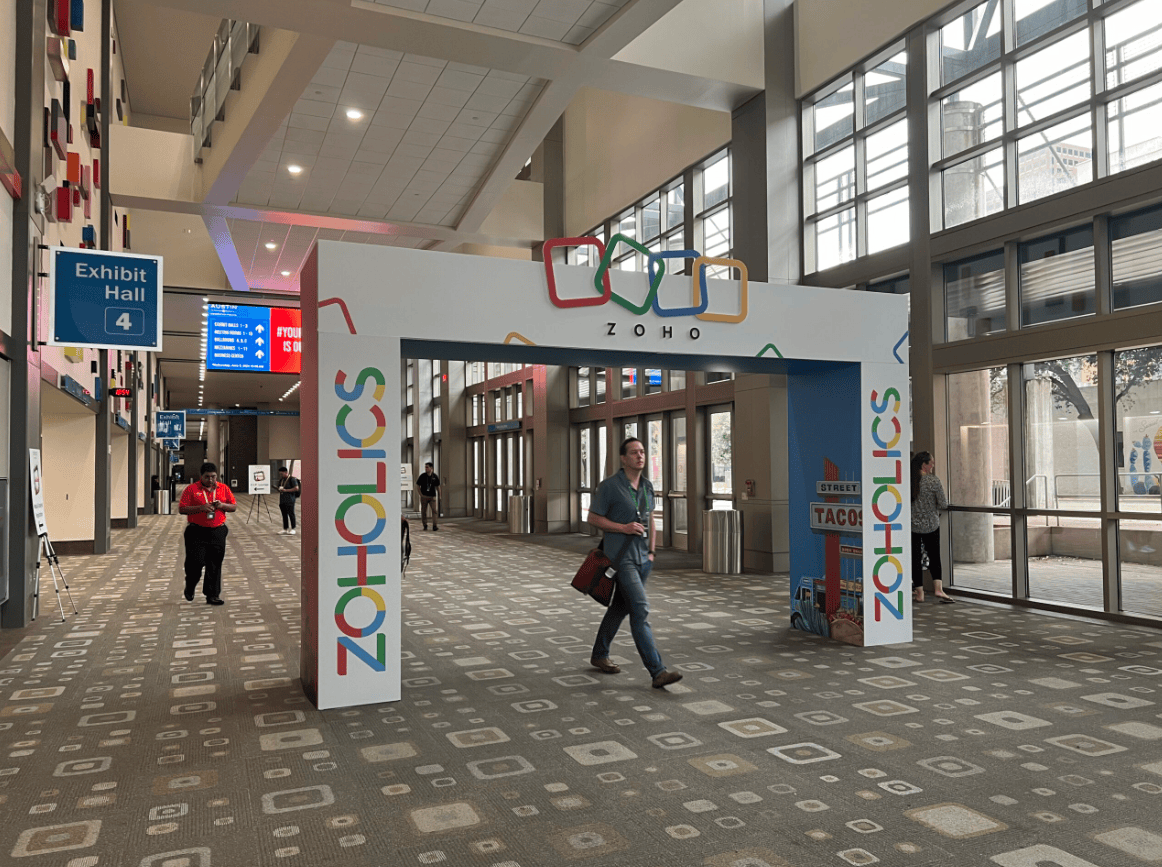
The Power of Integration and the Unified Zoho Ecosystem
A central tenet of Zoho's value proposition, heavily reinforced at Zoholics USA 2025, is the power of its integrated ecosystem, particularly embodied by Zoho One. Zoho One is presented as a comprehensive suite of over 45 integrated business applications designed to function as an "Operating System for Business," covering virtually every aspect of an organization's needs, from sales and marketing to finance, HR, and operations.
The benefits of operating within such a unified system, as opposed to managing a collection of disparate tools, were a recurring theme. A unified system facilitates seamless data flow across departments, effectively breaking down data silos that often plague organizations using disconnected software. This leads to a true 360-degree view of the customer, streamlined end-to-end business processes, reduced IT complexity and associated costs, enhanced collaboration among teams, and access to real-time, cross-functional insights.
Deep integrations within the Zoho suite were showcased as a fundamental enabler of powerful workflows. Examples include the tight integration between CRM and Marketing Automation for lead nurturing and campaign management , the connection between CRM and the Finance suite for streamlined quoting, invoicing, and payment collection , and the linking of Project Management tools with CRM for project tracking tied to customer accounts. Zoho Analytics pulls data from across the entire suite, providing unified business intelligence dashboards and reports.
The deep, native integration across the Zoho suite is not merely a convenience but a fundamental enabler of true business transformation, allowing for end-to-end process automation, unified data visibility, and cross-functional collaboration that fragmented systems cannot achieve. A major obstacle to efficiency and customer satisfaction is the use of disparate software systems that do not communicate effectively, leading to data silos, manual data entry, inconsistent information, delayed processes, and a lack of a single, comprehensive customer view. Digital transformation requires connected systems. Zoho's integrated suite directly addresses the fragmentation problem by ensuring data entered in one application is immediately available and consistent across others, eliminating silos and the need for manual syncing. This enables seamless workflows that can span multiple departments – for example, a lead generated in marketing flows into CRM, a deal closed in CRM triggers a project in Projects, which then leads to an invoice in Finance, and any subsequent customer query goes to Support, with all interactions linked and visible. This level of native integration provides a powerful foundation for automation and AI. Automated workflows using tools like Zoho Flow or Blueprint can trigger actions across different applications based on events in a single app. AI, such as Zia in Zoho Analytics, can analyze data from the entire suite to provide cross-functional insights and predictions. The "CRM for Everyone" initiative relies heavily on this underlying integration to provide a unified customer view across departments. This interconnectedness creates a compounding value effect – the value of the suite is greater than the sum of its individual applications. Zoho is providing a holistic platform that supports end-to-end business processes, not just isolated departmental functions. This integrated approach is crucial for achieving true digital transformation, leading to significant operational efficiencies, improved customer experiences, and better decision-making based on unified data.
While Zoho offers a comprehensive suite, it acknowledges that businesses often have existing IT landscapes that include third-party systems. To accommodate this reality, Zoho provides robust tools for integration with external applications. Zoho Flow allows businesses to integrate with over 1000 third-party apps using a no-code drag-and-drop builder to automate workflows between systems. Zoho also offers extensive APIs and a Marketplace with pre-built extensions for deeper integrations.
While promoting its integrated suite, Zoho also provides robust tools for third-party integration, demonstrating a pragmatic approach that acknowledges the reality of diverse existing IT landscapes and ensures flexibility for businesses. Few businesses operate solely on one vendor's software; they often have legacy systems, specialized tools, or preferred third-party applications that need to connect with new systems. Zoho's integration capabilities address this reality by understanding that businesses need to connect Zoho with their existing IT stack. Zoho Flow's no-code/low-code approach makes many integrations accessible without requiring deep technical skills.
This flexibility is crucial for adoption, especially for enterprises or businesses with complex existing systems, allowing them to adopt Zoho strategically, integrating it with critical existing applications rather than requiring a complete rip-and-replace. It also enables businesses to leverage specialized tools alongside the broad Zoho suite. Zoho positions itself as a central hub that can integrate with the wider business technology ecosystem, not a closed garden, increasing its appeal to businesses with diverse IT needs. This means businesses can adopt Zoho solutions while preserving investments in existing critical systems, and leverage expertise in integration to ensure seamless data flow and workflow automation across the hybrid IT landscape.
Analyzing the Impact: Business Transformation in Action
Business transformation is a widely discussed concept, defined not merely as the adoption of new technology but as fundamental changes in an organization's strategy, operating model, culture, talent, and processes, all aimed at improving overall performance and creating significant value. Research indicates that digital transformation is often challenging, with a significant percentage of initiatives failing to meet their objectives or sustain performance improvements over time, highlighting that technology adoption alone is insufficient for success.
Success requires addressing organizational, cultural, and talent aspects alongside technological implementation. Businesses often focus too heavily on implementing new technology without adequately addressing the necessary changes in underlying organizational structures, processes, and culture required to effectively leverage the technology. The high failure rate observed is a direct consequence of this technology-first, organization-second approach. Successful transformation necessitates a holistic strategy that integrates technology with people and processes. This means that simply acquiring Zoho's integrated suite or its new AI tools is not sufficient for achieving transformation. Businesses must also redefine workflows, invest in employee training and upskilling, adapt their organizational structure, and foster a culture of collaboration and data-driven decision-making.
Zoho's integrated suite, particularly with the advancements showcased at Zoholics USA 2025, directly supports key pillars of business transformation:
Customer-Centricity: Zoho CRM, especially with the introduction of "CRM for Everyone," and its marketing automation tools are designed to enable businesses to achieve a comprehensive 360-degree view of their customers. By unifying customer data from various touchpoints and departments, organizations can gain deeper insights into customer preferences and behaviors. This enables the delivery of highly personalized customer experiences across multiple channels. "CRM for Everyone" specifically targets the unification of customer operations across traditionally siloed departments, ensuring that all teams interacting with the customer are informed and coordinated. This shift from departmental tools to a unified platform centered around the customer is fundamental to modern customer-centric strategies.
Operational Efficiency: Automation is a cornerstone of Zoho's offering, and Zoholics 2025 highlighted its expansion through workflows, Robotic Process Automation (RPA), and the introduction of AI agents. These tools streamline repetitive tasks, automate complex multi-step processes, and improve productivity across various business functions, from sales and marketing to finance and HR. The integrated nature of the Zoho suite, combined with workflow automation tools like Zoho Flow and the customization capabilities of Zoho Creator, allows businesses to streamline processes that span multiple applications and departments, reducing manual effort and improving efficiency across the entire value chain. The Zoho Finance Suite provides integrated tools for managing accounting, inventory, expenses, and billing, further contributing to operational efficiency in back-office functions.
Data-Driven Decision Making: Zoho Analytics, powered by Zia's AI capabilities, serves as a central hub for transforming raw data into actionable insights. By pulling data from across the integrated Zoho suite and other sources, Zoho Analytics provides a unified view of business performance. AI features like Zia Insights provide automated analysis and narratives, while predictive analytics and anomaly detection help businesses forecast trends and identify potential issues. The ability to query data using natural language makes sophisticated analysis accessible to a wider range of users, fostering a data-driven culture throughout the organization. This empowers businesses to make more informed, strategic decisions based on real-time data, leading to optimized strategies, identified opportunities, and better measurement of transformation initiatives.
Zoho's integrated platform provides the technological foundation necessary for businesses to pursue comprehensive digital transformation. By offering a unified suite covering diverse functions, empowering users with automation and AI, and providing tools for deep customization and integration, Zoho enables organizations to address key transformation pillars simultaneously. However, the success of such initiatives also depends on the organization's readiness for change, leadership commitment, and investment in upskilling talent to effectively leverage these advanced capabilities.
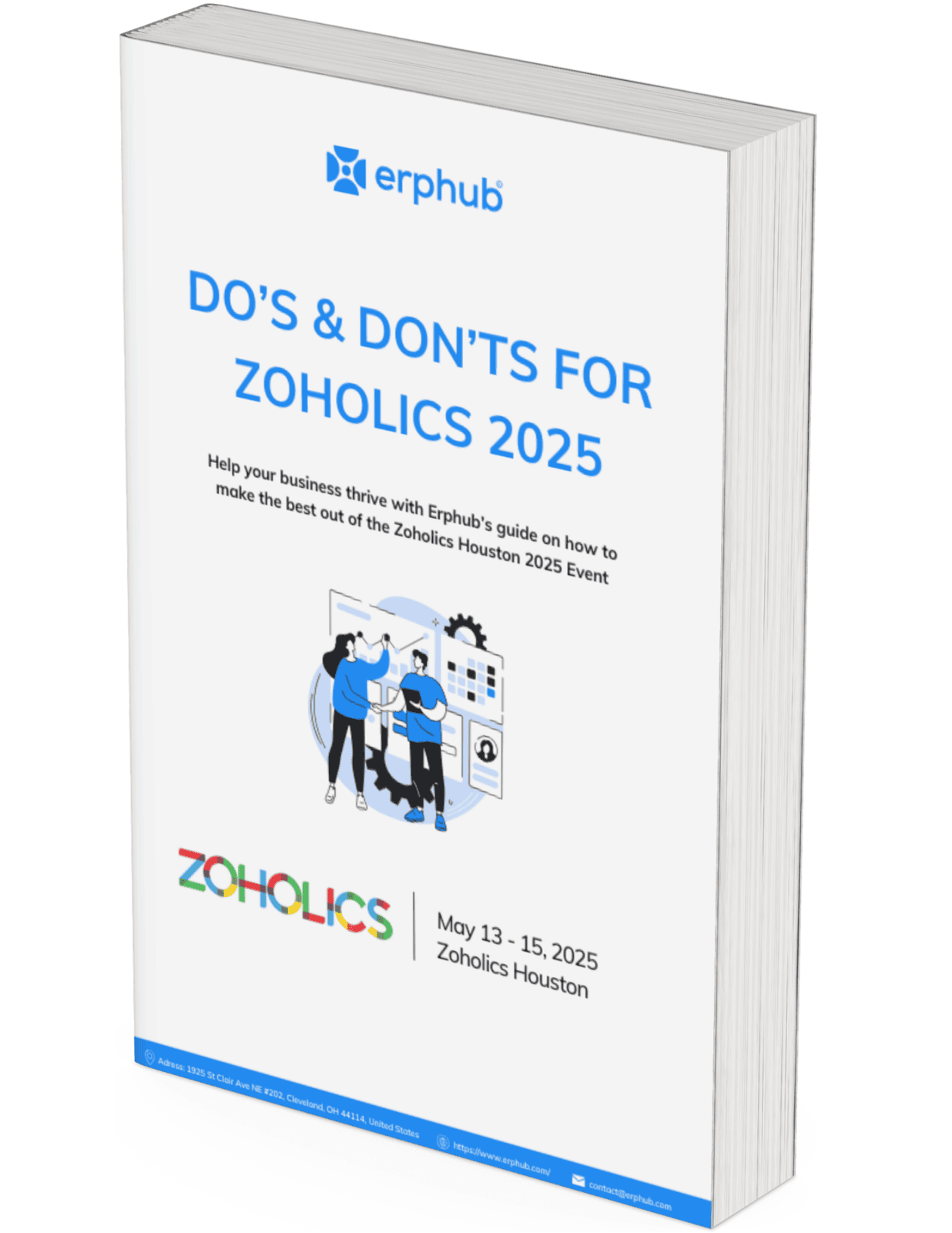

Conclusions
Zoholics USA 2025 underscored Zoho's strategic trajectory towards a future where business operations are increasingly powered by integrated AI and pervasive automation. The announcements and session themes from Day 1 and Day 2 painted a clear picture of a platform evolving beyond individual applications to function as a comprehensive, intelligent operating system for businesses of all sizes.
The introduction of "CRM for Everyone" represents a significant step towards breaking down departmental silos and fostering true customer-centricity by providing a unified view and collaborative environment around customer data across the entire organization. This move acknowledges the reality that customer experience is influenced by every department, not just sales or marketing.
The unveiling of Zia Agents, Agent Studio, and Agent Marketplace signals Zoho's commitment to the next wave of AI – autonomous, goal-oriented agents capable of automating complex, multi-step workflows. This strategic leap positions Zoho to address higher-order business processes, moving beyond task-level automation to redefine how work gets done within the enterprise.
Zoho's continued emphasis on data privacy and affordability in its AI strategy stands out as a deliberate market differentiator. By building its own infrastructure and committing to responsible AI practices, Zoho aims to build trust and democratize access to advanced AI capabilities, making them accessible to a broader range of businesses without prohibitive costs or data concerns.
The breadth of tracks and sessions at Zoholics, covering everything from core CRM and Finance to specialized vertical solutions and advanced developer tools, highlights the depth and versatility of the Zoho ecosystem. The focus on integrated solutions, workflow automation, and AI-powered analytics demonstrates how Zoho empowers businesses to drive operational efficiency, gain data-driven insights, and build highly customized solutions tailored to their unique needs.
Ultimately, Zoholics USA 2025 showcased how Zoho is leveraging AI and automation to create a more integrated, intelligent, and efficient platform for business transformation. The developments presented offer tangible opportunities for organizations to streamline operations, enhance customer experiences, and make smarter decisions. However, realizing the full potential of these advancements requires businesses to adopt a holistic approach to transformation, addressing not just the technology but also the necessary changes in processes, talent, and organizational culture. The integrated nature of the Zoho suite provides a powerful foundation, but successful transformation depends on how effectively organizations leverage these tools to redefine their operations and empower their people.
Key Announcements from Zoholics USA 2025 Day 1 (May 14th)

Day 1 Takeaways and the Path Forward
Day 1 of Zoholics USA 2025 in Houston delivered a clear and compelling vision for the future of business technology, centered firmly on the transformative power of AI and automation integrated across a unified platform. The keynotes set the stage by highlighting Zoho's strategic commitment to embedding AI deeply into its suite, positioning it as a fundamental layer for driving efficiency and enhancing decision-making.
The major announcements from May 14th provided concrete examples of this strategy in action. The general availability of Zoho CRM for Everyone marked a significant step towards breaking down departmental silos and unifying customer operations across the entire enterprise, enabling better collaboration and a holistic view of the customer. The launch of Ulaa Enterprise demonstrated Zoho's focus on securing the digital workplace at the endpoint, addressing critical concerns around data privacy and IT management in distributed environments. The availability of Zoho Payments in the US streamlined financial transactions by integrating payment collection natively within the Zoho ecosystem.
These announcements, coupled with the pervasive emphasis on AI and automation across various solution tracks (CRM, Marketing, Finance, Operations, BI/Analytics, Collaboration), signaled Zoho's intent to move beyond being a provider of a suite of business applications to becoming the foundational "Operating System for Business" , with AI and unified data at its core. The combination of extending CRM to all departments, enhancing underlying security, and integrating core functions like payments natively, all powered by pervasive AI (Zia, Agentic AI), paints a picture of a platform aiming to manage and orchestrate nearly every aspect of a business. This strategic positioning is a direct response to the complexity and fragmentation businesses face with disparate systems and aligns with the need for a cohesive approach to digital transformation.
The focus on both high-level AI strategy, such as the discussions around Agentic AI, and granular feature enhancements across various applications indicated a mature product development approach that balances an ambitious future vision with practical, immediate improvements for users. Announcing both cutting-edge concepts like Agentic AI and tangible, usability-focused features shows Zoho is addressing different levels of user needs and technological maturity. This balanced approach makes the platform appealing to businesses looking for both immediate productivity gains and a clear path towards future innovation, building confidence that Zoho's AI vision is grounded in practical application and user value.
Day 1 of Zoholics USA 2025 showcased Zoho's commitment to providing businesses with the tools needed to navigate the complexities of the digital era, enhance efficiency through intelligent automation, and foster unprecedented growth through a unified, data-driven approach. The event underscored that successful business transformation in 2025 and beyond will heavily rely on leveraging integrated platforms infused with advanced AI capabilities to break down silos, empower teams, and deliver seamless customer experiences. The insights gained from Day 1 offer a clear roadmap for businesses seeking to harness the full potential of the Zoho ecosystem.

